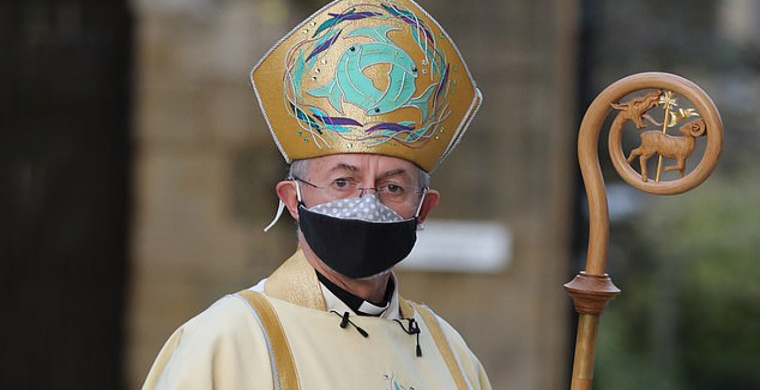Shutdown of churches and ban on weddings during Covid crisis has cost Church of England '£150MILLION' and could trigger a cull of parishes
Sources suggest Church of England lost £150m in donations during Covid crisis
Money-saving reforms could include cutting number of bishops to less than ten
Parish boundaries could be redrawn to reduce the number from 12,000 to 9,000
By STEVEN DOUGHTY FOR THE DAILY MAIL
https://www.dailymail.co.uk/
December 25, 2020
The shutdown of churches and the ban on church weddings and funerals has plunged the Church of England into a £150million crisis.
Highly-placed sources suggest it lost £150million in donations alone during the months when collection plates went unused and fees for special services such as weddings, funerals and christenings dried up.
And it is feared the Covid shortfall may have been much higher. The losses have prompted plans for sweeping money-saving reforms.
Among those discussed have been a cut in the number of bishops from more than 100 to as few as ten, and a redrawing of parish boundaries to reduce their number from 12,500 to 9,000.
Highly-placed sources suggest it lost £150million in donations alone during the months when collection plates went unused and fees for special services dried up. Pictured: The Archbishop of Canterbury Justin Welby.
The squeeze on finances was tightening before the pandemic but the closure of all churches from lockdown in late March until early June -- a decision taken by Archbishop of Canterbury, the Most Reverend Justin Welby, that was strongly opposed by many -- led to an unprecedented fall in income that may never be recovered.
Yesterday Mr Welby, wearing two masks, led a socially-distanced service at Canterbury Cathedral. The archbishop had urged the elderly to be 'sensible' and not to feel there was a 'compulsion' to attend this year.
But the congregation of around 90 -- in a cathedral that can hold up to 2,000 -- offered a sharp reminder of how pews across the country have been sparsely populated throughout 2020.
In the last year for which the CofE has published accounts, 2018, its parishes brought in just under £1.1billion.
Of this just over £500million came from 'giving', including money put into collection plates or contactless payments, and regular tax efficient donations by bank order.
Another £100million came from legacies and fees for services, and £63million from fundraising and appeals.
Efforts during lockdown to replace traditional collections by adding a 'donate now' red button to online services have failed to make up the shortfall.
It is feared the Covid shortfall may have been much higher and the losses have prompted plans for sweeping money-saving reforms.
An estimate of the losses was posted on Facebook by Archbishops' Council member Dr Ian Paul, who said they amounted to a third of parish giving -- around £150million.
The post has since been deleted -- but the Church has not denied the figure. A spokesman said it was 'true to say that the maximum fall in any one diocese is less than 20 per cent', but it was still too early to calculate the overall loss.
Since much of the Church is subsidised by its wealthiest dioceses, reductions of close to 20 per cent in these would have a major impact.
Anglican reforms are being debated under the working title of 'the emerging Church of England'. As well as cutting bishops and parishes, ideas discussed include rationalising the 42 dioceses across England -- some of which are said to be close to bankruptcy -- into fewer and more efficient units.
If parishes are reduced to 9,000, each with a population of 6,000, they could be asked to support their own clergy.
As a result jobs would be in danger, and smaller churches, including Victorian city churches, would close. Several hundred churches average only two worshippers each week.
The plans are intended to be made public in February. The Church's parliament, the General Synod, is likely to vote on them in July.
END














